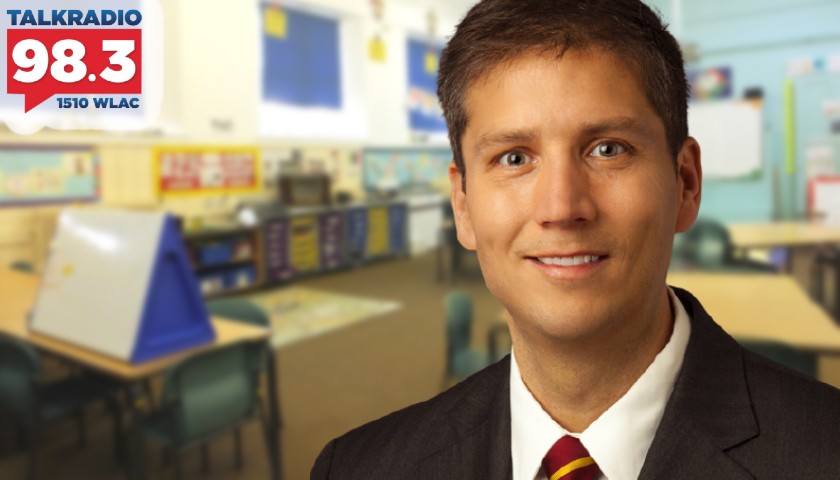Live from Music Row Friday morning on The Tennessee Star Report with Michael Patrick Leahy – broadcast on Nashville’s Talk Radio 98.3 and 1510 WLAC weekdays from 5:00 a.m. to 8:00 a.m. – host Leahy welcomed Vice President of Legal Affairs for The Beacon Center, Braden Boucek to the newsmakers line.
At the end of the second hour, Boucek weighed in on the recent ruling that deemed the school voucher programs to be unconstitutional because it was limited to only Davidson and Shelby Counties and violated the Home Rule Amendment. He added that this was a flawed position and was optimistic that it will be successfully elevated to the Tennessee Supreme Court for a final ruling.
Leahy: We are joined now by a Braden Boucek who is the Vice President of Legal Affairs for The Beacon Center. And welcome to the Tennessee Star Report, Braden.
Boucek: Thanks for having me on.
Leahy: So you’re a University of Richmond Spider. Go Spiders! And Florida State law.
Boucek: Proud Spider.
Leahy: A proud Spider and experience with the Department of Justice. Great, a number of awards there. Braden, you have followed with great interest the litigation surrounding Governor Lee’s voucher program. The court of appeals ruled that it was unconstitutional. The Beacon Center has said, no absolutely it’s constitutional. It’s headed probably towards the Tennessee State Supreme Court. Tell us the argument for the constitutionality of that program.
Boucek: Yeah and it’s important to take a step back and figure out what this is. As many of your listeners know, an educational savings account is really just a way of the state giving parents full control of a portion of their education funds for their students’ education. Without a doubt, it is the most innovative and transformative approach to the failed educational model in the state’s history.
This is naturally something that we decided in implementing it, that we needed to be thoughtful about how the governor instituted it as a pilot program. And that pilot program was aimed at the two worst-performing school districts in the state. And also the two biggest school districts in the state – Shelby and Davidson County.
And we represent two mothers, working mothers, single mothers who have kids who the educational system has just failed. And they wanted to avail themselves of the program. Both of our parents are located in Metro Nashville Davidson Schools. They’ve tried everything they can do within the traditional public school framework and they’re not having any success. And instead of Metro Nashville being supportive of this program, they’ve sued. And now my parents are in court fighting desperately to save this educational lifeline for the children.
Leahy: And so what’s the argument that the court of appeals found persuasive to the contrary? They ruled that it was unconstitutional. What was the argument? And why was that reasoning false or incorrect in your view?
Boucek: They did not rule that the program was unconstitutional for any reason other than the fact that it narrowly targeted the two worst school districts in the state. And just take a step back and think about it. Obviously, if you’re going to send a targeted program out through a pilot program, you’re going to aim it at the two worst school districts in the state. But that was not the reasoning that prevailed in front of the court of appeals.
They ruled that it violated the state’s quote-unquote Home Rule Amendment which requires generally general legislation out of the state. Now that argument is flawed. And it runs up against the plain text of the constitutional amendment. At The Beacon Center, we are rigid textualist constitutionalists and we think the constitution even the Tennessee constitution needs to be interpreted in light of what the words actually mean.
And the Home Rule Amendment that the judges have seized upon applies to local governments. But the way that the ESA program works is it doesn’t target local governments at all. It applies specifically to LEA’s or local education associations, and those are state agencies. So this is a lot like one state agency suing the state itself for reducing its funding. It’s is crazy.
Leahy: So where does this go now? Where’s the litigation go?
Boucek: We hope that the Tennessee Supreme Court takes it.
Leahy: You said we hope. Why is that a hope and not a certainty?
Boucek: There’s no requirement that the Tennessee Supreme Court has to take a case. Its review is purely discretionary. We think though for an issue of this magnitude and importance, and with a ruling deconflicting that, there’s a high degree of likelihood that the Supreme Court will take it.
Leahy: When will we know?
Boucek: Hopefully sooner rather than later. I mean the program was supposed to go into effect for this school year, which is anybody who has children and Metro or Shelby knows they really really could have used it in light of the COVID shutdowns. But the judge’s ruling thus far has mucked that up. So now the question is going to be can we get a rolling so that the program can go online for 2021.
Leahy: Yeah. That’s a fairly tight timeline. Braden do you go in and do you argue in court. You are a litigator. Are you in court making these arguments?
Boucek: We’ve been doing it all by Zoom.
Leahy: Okay, but you officially make the argument via Zoom before the judges in the court of appeals. Is that right?
Boucek: That’s right. Yep.
Leahy: What’s that like doing an argument by Zoom?
Boucek: Well, it’s great. I think it’s innovative and you know, I hope we incorporate a lot of these things that we’ve learned going forward. It’s not so great when your Roomba Robot comes out and gets stuck in the middle of the oral argument. (Leahy laughs)
Carmichael: What was the Appellate Court? How many judges are there? And what was the vote?
Boucek: There are three judges on a panel. And the judges ruled three to 0 against us.
Leahy: Okay. So it is that any indication as to whether or not the Tennessee state supreme court will take it up?
Boucek: I don’t think so. No, I mean the justices tend to look at the importance of the issue and whether or not there’s conflicting law on the subject. and you know that the way that the court of appeals interpreted this marks a radical expansion of the way that the text of the constitution reads. And it’s in the conflicts with prior cases. So we think there’s a high degree of likelihood that the Supreme Court will take it.
Leahy: Okay, and I’m looking at it from afar not being an attorney, but I would say for a case of this importance I think it would make eminent sense for the Tennessee State Supreme Court to take the case and to issue the final ruling on it. It would seem to me if they take it up how long will the argument be?
Boucek: Typically arguments are 15 minutes per side. And the court of appeals, we asked for and got additional time in light of all of the parties because it’s not just the state of Tennessee. There are multiple what are called intervenors. so people like us who represent parents that have a stake in the program have been allowed to participate in the case. So with that many people, the courts were generous enough to give us extra arguments on
Leahy: Last point, Braden Boucek, Legal Affairs Vice President for the Beacon Center, want to invite you to attend and perhaps play a role, if you’d be interested, in the National Constitution Bee that we are sponsoring with our little Star News Education Foundation in Brentwood on October 24th. Kids’ eighth grade through 12th grade can participate. There is a $10,000 scholarship to the winner.
Boucek: I didn’t, but I fully support the mission and the vision obviously. I think we can all agree that our training of the constitution has been lacking as of late. I’d love to be a part of it.
Listen to the full second hour here:
– – –
Tune in weekdays from 5:00 – 8:00 a.m. to the Tennessee Star Report with Michael Patrick Leahy on Talk Radio 98.3 FM WLAC 1510. Listen online at iHeart Radio.
Photo “Braden Boucek” by Beacon Center Tennessee. Background Photo “Classroom” by Educators .co.uk. CC BY 2.0.





